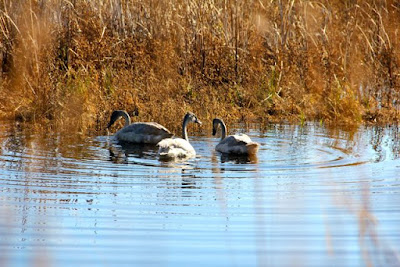sandhill cranes at Crex Meadows
Photo by J. Harrington
We made our first visit to Crex Meadows yesterday, although we've lived in the area for more than twenty years and have had naturalist friends who've mentioned Crex a number of times. As I've become more and more focused on local foods and the local economy and my bioregion, I've been more inclined to explore local attractions instead of heading to the far corners of the state or the United States. Although I believe we're past the peak of this Autumn's migration season, there are still enough sandhill cranes and trumpeter swans around to make me glad we went and wonder why we hadn't done it before. I suspect in part it was because I didn't want to pay for a Wisconsin hunting license for those many years when my shooting was done with a shotgun instead of a DSLR camera. That's been changing over the past several years. The eight sandhill cranes in the photo above were out of anything I've ever considered reasonable and responsible shotgun range. (They're also an indication of how I've often got the "wrong lens" on my camera. Saturday's photography lesson didn't get into lens selection.)
three cygnets at Crex Meadows
Photo by J. Harrington
The St. Croix River often has trumpeter swans that Winter over, but I've rarely seen any cygnets (young swans, still gray) such as the three in the photo below. My Better Half did a superior job of navigating us around the dike roads. At one point we encountered a plaque with a brief history of how Crex Meadows came to be. The last paragraph starts with the phrase "Exploited to the fullest, ..."
Crex Meadows plaque
Photo by J. Harrington
which reminded me of the situation Minnesota currently faces with mining, particularly sulfide rock mining. I haven't seen any coverage of the proposed PolyMet NorthMet project, nor of the Twin Metals project, which frames the issues as a choice between consumptive and non-consumptive uses of our limited resources or developing renewable versus fossil fuel based economies. Destroying acres of land to "remove overburden" to get at very low grade ore isn't much of an improvement, to my mind, over blowing the tops off of Appalachian mountains to get at the coal. They both seem to move well beyond consumptive into destructive uses of the land in a non-renewable manner.
Maybe it was being in kind of "Sand County" country may famous by Aldo Leopold and those like him that brought this kind of thinking to mind. In my opinion, we can compare resource exploiting employment (mining, for example) with the kinds of long term, sustainable employment provided by members of the Downstream Business Coalition in Duluth. Crex Meadows, over the course of 30 to 40 years or so, provided limited employment, but there's no Crex Carpet Company today. I guess one of the other things that troubles me is I've yet to see any reclaimed mining land as beautiful and naturally productive as Crex Meadows.
Do we really want to make northern Minnesota the new "mountain top mining" center of the country? We can do better than that in terms of both the number of jobs produced and their duration. If it weren't for major employers in other parts of Minnesota claiming their production expansion and employment growth is being severely hindered by a lack of housing, why would we be providing millions in public subsidies for workforce housing. We just have to hope that those employers benefitting from workforce housing have a longer and better and less volatile future than the steel industry or Crex Twine Company.
Wind, Water, Stone
for Roger Caillois
Water hollows stone,wind scatters water,stone stops the wind.Water, wind, stone.
Wind carves stone,stone's a cup of water,water escapes and is wind.Stone, wind, water.
Wind sings in its whirling,water murmurs going by,unmoving stone keeps still.Wind, water, stone.
Each is another and no other:crossing and vanishingthrough their empty names:water, stone, wind.
********************************************
Thanks for visiting. Come again when you can.
Please be kind to each other while you can.



No comments:
Post a Comment